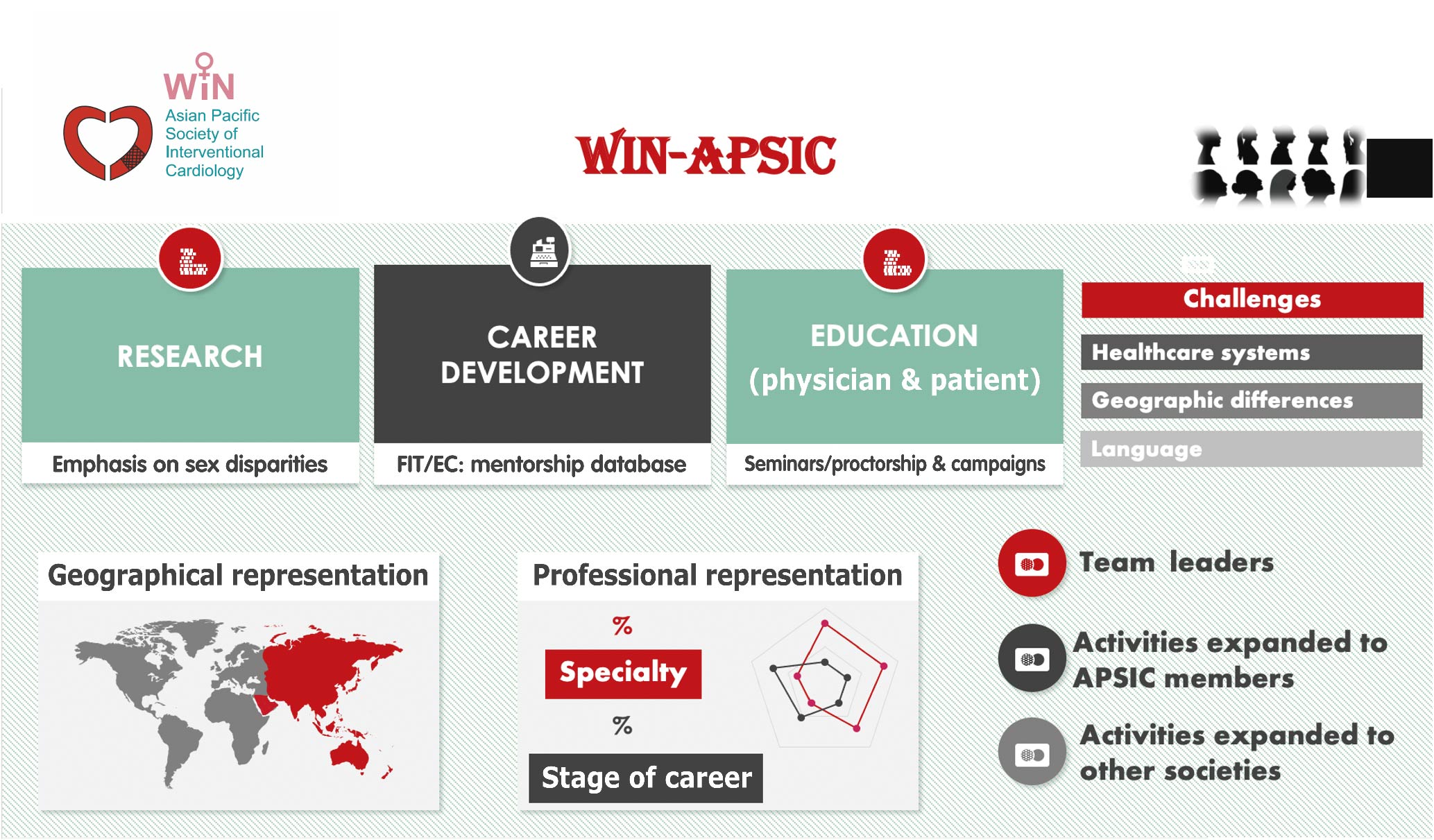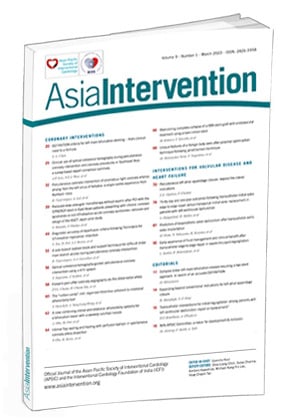Several international bodies have acknowledged the role of women in growth and progress in multiple fields including, within the field of medicine, interventional cardiology. The United Nations Women’s Asia and the Pacific council established the Women’s Empowerment Principles that encourage equality and promotion of education, career development and health and safety1. These principles suggest a self-sustaining nexus that ensures the interrelationship between inclusion and development. As such, many societies, such as the European Association of Percutaneous Coronary Interventions (EAPCI), have established committees specifically addressing the role of women.2. In line with this, the Women-In-Asian Pacific Society of Interventional Cardiology (WIN-APSIC) was launched on 25 July 2022, with Professor Fazila Malik as Chair and Dr Mirvat Alasnag as Co-Chair. This initiative was initiated and supported by Professor Ashok Seth (President of APSIC) and uniformly endorsed by the APSIC Board.
The committee remains unique in that it includes women from a larger geographic community compared with any other society to date. It includes 25 countries with a diverse set of healthcare systems, languages, genetic and environmental determinants as well as economic and population standards. Although such diversity may be considered a challenge, these are, in fact, the strengths of the APSIC. Diversity offers an opportunity for key opinion leaders to learn from research and clinical pathways which have been adopted in other member countries and to improve systems locally. This is particularly important for women as multiple publications have identified gender disparities in career opportunities, research and patient care.
With respect to career opportunities, several surveys have reported a reduction in, and underrepresentation of, women who are seeking leadership roles in both the United States and Europe345. While attempting to report numbers in the Asia-Pacific region, it was difficult to find a common percentage, with numbers ranging from 33% of practising interventional cardiologists in Indonesia being women to only 1 woman in Singapore6. The lack of a database capturing practitioners across the region warrants a better understanding of the local landscape of the interventional cardiology field. How did Indonesia achieve that number? They can perhaps teach the world about inclusion and the contributions of women. The WIN-APSIC committee hopes to provide a platform for Indonesian women to serve as role models and share their stories about work-life balance with aspiring and early-career women globally. To date, what is apparent is that the world and the region are unaware of this great achievement in Indonesia, and women are still invisible as lead investigators or heads of scientific committees. The purpose of WIN-APSIC is to permit better visibility of female interventional cardiologists and to create a database with networking and mentorship opportunities.
Here we segue to the next point, concerning research that addresses gender-specific outcomes. Several studies evaluating the safety and efficacy of medications, such as antiplatelet therapies, and procedures, such as transcatheter therapies, have been reported78. However, whether these pertain to women in the Asia-Pacific region remains unknown and warrants further exploration. For example, the WIN GULF TAVR Registry (Women IN Gulf Transcatheter Aortic Valve Replacement) noted that women in the Gulf had fewer bleeding and vascular complications compared with their European counterparts in the WIN TAVI (Women’s International Transcatheter Aortic Valve Implantation) registry9. It also noted a higher rehospitalisation rate for cardiac causes and myocardial infarctions compared with men despite a better overall survival rate. This registry is a mere example of the unique population of this region, with the potential for large population-based studies.
The WIN-APSIC initiative, therefore, concentrates on 3 core objectives: research, career development and education for patients and physicians (Figure 1). Research will seek to include registries and randomised trials specifically examining gender differences. Educational activities will revolve around collaborative projects addressing both theoretical knowledge and proctorship for interventional cardiologists. It will also emphasise patient awareness campaigns targeting all regions of the Asia-Pacific and in multiple languages. Finally, career development will provide opportunities for women to develop interventional skills as well as to expand faculty assignments.
Empowering women can, hopefully, spur productivity and growth in the field of interventional cardiology. A central goal of the WIN-APSIC committee is to contribute to progress in the entire community through diversity with representation from across the region as well as from various specialties and career phases. A cornerstone of the success of the committee lies in the understanding that the committee is a nexus for a symbiotic relationship between male and female interventional cardiologists engaged in each core objective.

Figure 1. WIN-APSIC. APSIC: Asian Pacific Society of Interventional Cardiology; EC: early-career; FIT: fellows-in-training; WIN-APSIC: Women-In-APSIC
Conflict of interest statement
The authors have no conflicts of interest to declare.
